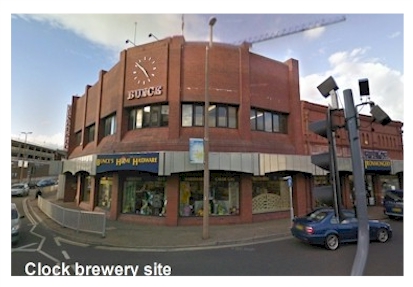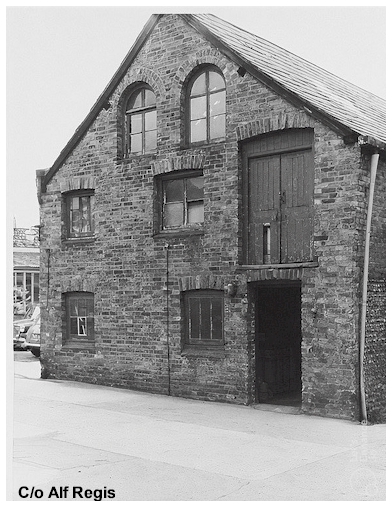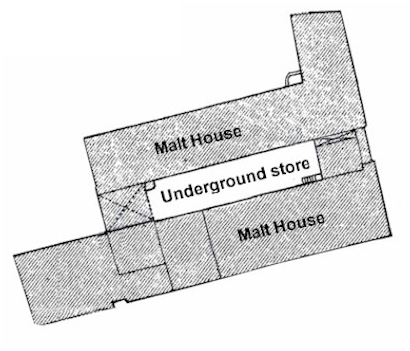 |
The clock beer house was a
later addition to the Clock Brewery on the corner of what is now
Chapel Road (was North Street) and Lennox Road.
Most of us will have more recent memories of this plot of land as
being where Bunces, the hardware store, once stood, itself now a
block of flats.
The clock name was given because it had a clock on the front,
apparently the first in Worthing, a tradition Bunces' carried on
until its demise.
Henfrey Smail in his 1946 book, 'The Worthing Map Story' mentions
the Clock Brewery but reveals very little, we however have
discovered a story worth telling. |
|
It was acquired in 1851 by the
Allen Brothers and burnt to the ground in 1854. The town fire pump
failed to work in extinguishing the blaze as it was found to be
clogged up with grain.
We're not saying it was on purpose, but it gave the Allens an
opportunity to rebuild, something they took advantage of, and in
part, secretly.
Alfred and Dennet were popular maltsters in Worthing, they paid a
generous price for barley, and the staff were well rewarded for
their work.
Despite high outgoings, they seemed to make an excellent profit year
on year and became wealthy, but there was a secret behind their
success, one that select members of staff were aware of. This was
later to become their downfall when one member of staff attempted to
blackmail them.
The Allens chose not to yield to his demands and called his bluff.
It would turn out the now ex-employee had tipped off the authorities
that all was not as it seemed with the business, but didn't give any
details.
A surprise inspection at 4 am on 31 March 1857 by customers
inspectors initial revealed nothing, in spite of searching for five
hours. As hope was being lost, a discovery was made, soft mortar in
some brickwork. |

|
 |
What was discovered was a cast
iron framework in which bricks were set, a simple but ingenious
device that allowed a section of wall to be removed and replaced
with the minimum of noise and effort.
Once back in place, only the outline needed to be covered up using
fresh but weak mortar, toned to blend in with the rest.
What was discovered behind was a short passageway down to an
underground vault full of barrels of malt, the contents being
exactly the same as those upstairs. It would appear that for every
barrel they sold, they sold another tax-free.
There had been a high tax levied on malt to fund the cost of the
Crimea war against the Russians, making the Allen's venture very
profitable, and popular with his regular customers, who of course
asked no questions. |
|
On the other side of the
vault, another fake wall was discovered leading up to the second
malthouse above ground. This would enable work on one side to be
carried out without the other side knowing, hence only a select few
were ever involved. The vault itself spanned the width of the
courtyard between both malthouses.
This might explain the sudden fire in the original building, a year
after the war in Crimea started. Again, we're not saying it was
started as an excuse to build a secret vault, but it does fit so
well.
The Allen brothers faced a hefty fine and back duty as the case
would go to court on the 16th of June. Until then, they were free to
carry on trading their legitimate goods.
The police were suspicious of the brothers, fearing they would try
to leave the country, detectives kept an eye on them. |
The police were suspicious of
the brothers, fearing they would try to leave the country,
detectives kept an eye on them.
It would turn out their suspicions were well-founded. The day before
the court case, both brothers boarded a steamer for France. The
detectives followed but the brothers cunningly doubled back and
caught another steamer to London, leaving their police tails heading
for Paris.
When the Allens reached London, they boarded an express train to
Liverpool to eventually set sail for America and sanctuary. The
legal case proceeded, and a fine was set at £370,000, later reduced
to £110,000.
After a lengthy period of time, the Solicitor General reduced the
fine to £10,000 with the idea that something was better than
nothing. The Allens paid and returned home. |